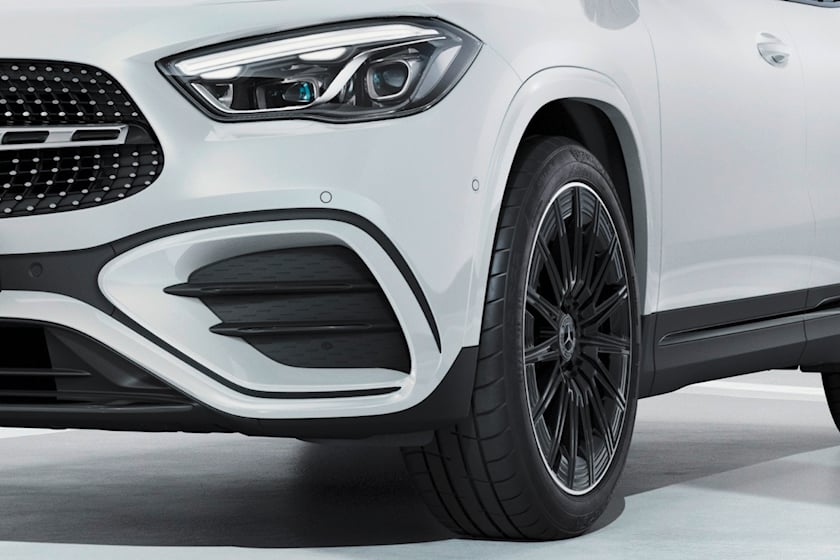
The Mercedes-Benz GLA is the smallest Sports Utility Vehicle (SUV) in the German automaker’s lineup, slotting beneath the slightly larger GLB and well below the compact GLC.
But, in spite of its size, the GLA manages to deliver Mercedes levels of comfort and refinement. For 2024, the GLA receives a subtle refresh, which brings with it a 48-volt mild hybrid upgrade to the subcompact SUV’s existing powertrains, a standard 10.25-inch touchscreen, wireless Apple CarPlay and Android Auto, and several other changes. Sadly, the 382-horsepower AMG GLA 45 is no more.
Engines and mpg
Both the GLA 250 and AMG GLA 35 receive mild hybrid electrification. That system uses a belt-driven starter-generator to quickly restart the engine from a stop and temporarily boost output by up to 13 horsepower under certain conditions.
Additionally, the setup can shut off the engine when the vehicle is in motion, allowing it to coast until the gas pedal is pressed again.
This functionality should give it a slight bump in efficiency, though EPA numbers have yet to be released.
Competitors to consider
The GLA competes with other subcompact luxury SUVs, including the Audi Q3, BMW X1, Cadillac XT4, Lexus UX and Volvo XC40. It’s also likely to be cross-shopped against the larger GLB, which shares the same platform, but offers more space.
POLL
The GLA has a lower starting price and gets slightly better fuel economy.
Expert Rating
This second-generation Mercedes-Benz GLA is a huge improvement over its rather compromised predecessor. It’s comfortable and suitably refined for an entry-level SUV.
Performance
The GLA 250, which is the model that was tested, should be more than enough for the vast majority of drivers. Power is appropriate for the vehicle size, and it gets up to speed with ease. The front-wheel-drive test vehicle needed 6.8 seconds to hit 60 mph, which is an average time for an extra-small luxury SUV.
The engine and transmission are mostly smooth, though you’ll notice some engine vibration from the automatic engine stop-start system when it first fires up. The transmission can also be a little slow to engage when you mash the gas for a quick burst of speed.
Around turns, the GLA is stable and secure. Less impressive were the numbers during our panic-braking test, where the GLA 250 needed a long 138 feet to stop from 60 mph.
Comfort
In close to base form, the GLA delivers a good amount of overall comfort. The MB-Tex synthetic leather breathes well on hot days, and the seats provide plenty of support and cushioning for longer drives.
Short and tall drivers should find the front seats to their liking thanks to the generous adjustment range and extendable thigh supports. Multi-contour seats with heating and ventilation are available as options.
The ride quality is pretty good too, with no harshness over road imperfections. Undulations can cause some moderate jostling, but the suspension strikes a good balance of handling and comfort.
On the downside, road noise is noticeable and sometimes intrusive on coarse road surfaces. The engine sounds laboured under hard acceleration, but it is otherwise well muffled.
Interior
The ride height and sensibly sized doors make it easy to get in and out of the GLA even in very tight spots.
The wide adjustment ranges for the driver’s seat allows you to select a more upright or reclined position with no compromise.
The primary controls are logically placed and easy to read. You control many of the secondary features with the infotainment screen, which doesn’t take long to get acquainted with.
The cabin is surprisingly spacious and airy considering the GLA’s sleek profile. There’s plenty of adult-sized space in the rear too.
Visibility out of the front and to the sides and rear is clear, which helps with safety and parking.
Technology
The GLA gets high marks for its infotainment system and Apple CarPlay and Android Auto smartphone integration. Mercedes’ MBUX system is one of the easiest systems to use, with multiple control methods (touchscreen, trackpad, voice control and steering wheel thumb controllers). Voice commands are accurate, but sometimes take a moment to process.
Disappointingly, the GLA is pretty light on standard advanced safety features. Only frontal collision mitigation and a blind-spot warning are included unless you spring for some costly option packages.
That’s a little surprising these days when a Kia or Toyota comes with a full suite of driver aids.
Storage
Cargo capacity behind the rear seats is only 15.4 cubic feet, which is more in line with what we expect from a midsize sedan. It’s accommodating, but small compared to the cargo areas in some key rival SUVs. The low liftover height does make loading heavy objects easier.
Inside, there are moderately sized bins and pockets for your things. The cup-holders feature some nifty spring-loaded tabs to better secure smaller beverages or personal items.
A rubberised tray serves as a wireless charging pad and does a good job of holding your phone. Got small children? A rear-facing infant seat should fit without affecting front passenger space. The car seat tether and anchor points are easy to find too.
Fuel Economy
The EPA estimates fuel economy for the front-wheel-drive GLA 250 at 28 mpg combined (24 city/34 highway).
We observed 31.2 mpg on our 115- mile evaluation route that includes a fair amount of highway driving, indicating that the EPA’s numbers are realistic.
Overall, the GLA 250 is a little more fuel-efficient than rivals such as the Audi Q3 and Volvo XC40.
Value
The GLA’s starting price is reasonable, but doesn’t include some features you’ll probably want. Be prudent with your picks and your GLA should come in under $40,000. The GLA is built just as solidly as any Mercedes-Benz, though there is more hard plastic inside.
The good thing is those pieces are convincingly grained and aren’t placed where we’d normally come in contact with them. It’s a definite step up from the first-generation GLA.







